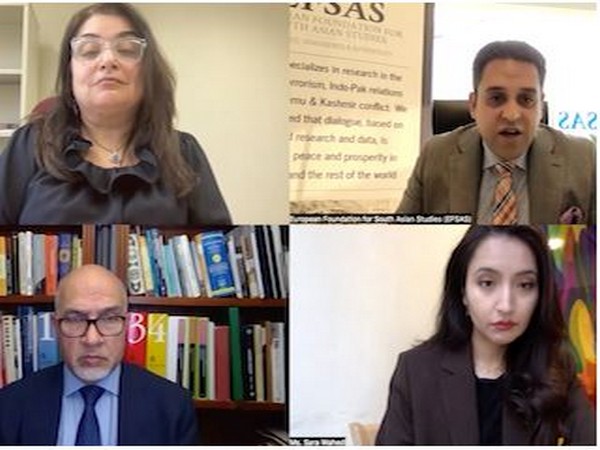An all-Afghan panel consisting of a scholar, former diplomat and young innovator at the 49th Session of the UN Human Rights Council discussed the human rights situation in Kabul after the Taliban takeover of the country in mid-August and expressed concern over the transformation of the educational system under Taliban rule which may turn Afghanistan into a hotbed of terrorism. On the side-lines of the 49th Session of the UN Human Rights Council in Geneva, the European Foundation for South Asian Studies (EFSAS) organised a Webinar on March 30 on ‘Human Rights Situation in Afghanistan’, in order to illuminate the increasingly deteriorating situation there. Moderated by Junaid Qureshi, Director EFSAS, the session was joined by a large number of attendees, including human rights activists, NGO representatives, diplomats and researchers. The event was held on March 30.
Mahmoud Saikal, Adjunct Professor at the University of Canberra, Chair of Kabul Association of Integrity, Former Deputy Foreign Minister of Afghanistan and Ambassador to the United Nations and Australia, noted that human rights violations have become commonplace under Taliban rule. “Male government employees have been forced to pray, grow a beard, and wear traditional clothes, whilst the Taliban have also banned foreign media outlets and restricted the operations of domestic media outlets. To bolster the ranks of its suicide divisions, the Taliban has started to recruit orphans,” he said in a statement. He highlighted that the Taliban’s transformation of the educational system is likely to make Afghanistan a hotbed of terrorism.
Turning toward the humanitarian situation in Afghanistan, Saikal suggested that 60 per cent of all Afghans are currently in dire need of humanitarian assistance. The international response to the Taliban’s takeover, Saikal argued, for instance in the case of UNAMA, has been reactive rather than proactive. He also noted that the existing UN architecture, including the General Assembly, the Security Council, and the Human Rights Council, has been incapable of adequately responding to the deteriorating situation in the country. Saikal concluded that the Taliban’s approach toward the Doha Agreement indicates that the Taliban must be judged based on its behaviour rather than its rhetoric.
Dr Bahar Jalali, Associate Professor of History at Loyola University Maryland, US and founder of the first Gender Studies programme in Afghanistan, emphasized that the Taliban cannot be described as an Afghan movement as the ranks of the Taliban were recruited from Afghans who had fled to Pakistan and who had thus never experienced a traditional Afghan life.
During the 1960s, Dr Jalali noted, the Afghan elite was constituted by a comparatively progressive group that promoted the introduction of a progressive constitution in 1964 that was followed by the election of the first female representatives to the Afghan parliament in 1965. Afghanistan’s trajectory changed significantly following the 1978 Saur Revolution, reversing much of the progress that Afghanistan had made in previous decades. Given Afghanistan’s historical record regarding female empowerment, she highlighted that the US-sponsored reforms post-2001 did not necessarily reintroduce new social norms but enabled the reaffirmation of values that had been suppressed by the Taliban.
Speaking at the event Sara Wahedi, CEO and Founder of Ehtesab, Afghanistan’s first civic technology startup echoed the opinions of the previous speakers and argued that the humanitarian situation in Afghanistan has become extremely dire with the extrajudicial killings and arbitrary detentions of journalists, human rights activists and individuals who oppose the Taliban regime. In addition, starvation and child labour are on the rise, while a liquidity crisis is crippling the Afghan economy. She further stated that with the presence of the Islamic State in Khorasan Province the status quo has deteriorated even more. Wahedi concluded her speech by emphasizing the importance of protecting and supporting responsible journalism – journalism that takes time and relies on a variety of sources – particularly at a time when people are overwhelmed, politicization is at play, and fake news and misinformation are proliferating.
The event was followed by a very vibrant and enlightening Q&A session during which the audience and speakers exchanged opinions on various topics including Pakistan. Asking about ‘How is Pakistan’s foreign policy towards the Taliban going to develop in the coming months given the Taliban’s support for the TTP?’, Saikal said that the equation between Pakistan and the Taliban has changed since the latter came to power, as Pakistan’s intelligence agency – Inter-Services Intelligence (ISI) would like to keep them subservient in order to control them.
As a result, Pakistan is likely to ensure that the international community does not recognize the extremist group and encourage international NGOs from Afghanistan to set up offices in Pakistan. Jalali also discussed the normalization of the Taliban in the eyes of the international community and the latter’s defeatist attitude, showcasing the West’s incompetence and lack of accountability. Moreover, the root cause of the problem according to her was Pakistan remains a major non-NATO ally and thus too important for the US to get sanctioned for its role in nurturing and supporting the Taliban. Saikal concluded that unfortunately, Afghanistan will become a breeding ground for terrorism to China, South Asia, Middle East, Central Asia, Europe, Australia and the Americas, yet concerned parties, including India, where the gravity of the problem will play out because of Pakistan’s strategic depth policy, still seemed unalarmed.

